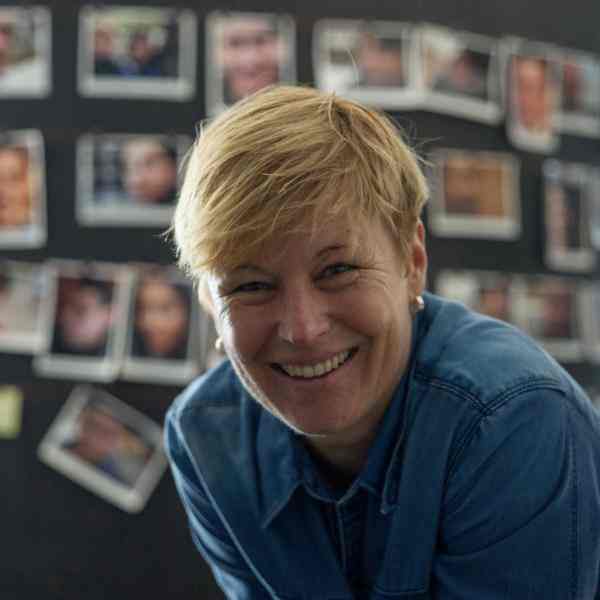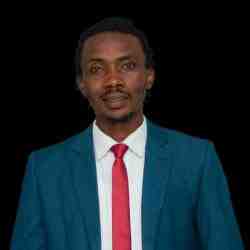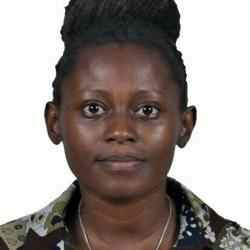Introduction
While in Germany`s education system opportunities are still closely tied to individuals’ socio-economic and cultural background, existing structures rarely allow for fundamental changes in approaches. Realizing this Steffi Biester introduces a multi-year program for educational institutions that allows them to fundamentally shift their curricula and culture. She allows young people and those working with them to see potential where deficits have been in focus before – a needed basis to build engaged, democratic societies.
L'idée nouvelle
Steffi has found a way for the rigid education system to move from a deficit-frame of defining someone's potential based on their background to an abundant view of everyone having unique potential and power that can be unlocked. Her insight being: There are strong mental models and structures to work with and alter, where a system overthrow is not an option. Her answer: An attractive offer on the surface – streetfootball - which is backed by a finely researched and developed learning and development program with high flexibility to adjust to a variety of educational contexts yet high scalability due to its modularization.
While other initiatives have used the power of streetfootball before, Steffi has proven herself unique in that her learning modules serve as an effective tool to sustainably change the DNA of schools. Streetfootball provides a powerful frame for young people to engage with others across racial lines, reduce prejudice, develop intercultural appreciation and skills, and - in that way - develop competencies critical for engaged, democratic societies. Steffi accompanies young people through a multi-annual process of gradually taking over responsibilities and ownership over their personal and professional future. The comprehensive KICKFAIR educational model is frame worked by societal values, norms and behavioral principles which aim at socially responsible behavior. This companionship throughout the entire school career goes beyond punctual intervention and has lasting social impact for the targeted youth.
Schools as well as other implementing partner organizations are always equally involved in the development and implementation of the concept that is adapted to local needs and conditions. A first sample of schools has successfully shown the full adaptation of their curricula to the KICKFAIR education concept. By re-orienting their ultimate educational goals and role as schools, they have restructured and integrated school subjects and learning formats already showing positive large-scale impact.
With her alternative education concept, Steffi has found different levers to shift the current educational ecosystem locally and globally. Streetfootball generates the interest and collaborative spirit needed to reach educators and students with the objective to apply the impactful learning modules over a long period of time. And it does not only reach those particular interested in football – but far beyond. This does not only change the lives of the targeted students, but also positively and sustainably impact the teachers themselves, the schools as well as the school context. Moreover, Steffi has understood that streetfootball serves to find common ground among stakeholders to then build a movement around competency-based education and to leverage social impact through other organizations and a network.
Le problème
Steffi observed that young people from disadvantaged backgrounds are defined by their deficits and miss their chances for participation and co-determination. In a system that is not designed for them or is empathetic to their needs, they constantly experience failure combined with a lack of perspectives which ultimately leads them to become frustrated and fearful. Among the OECD countries, Germany has the most differentiated school system with the goal to divide students into homogenous learning groups after primary school at the age of ten. There are four different school types with differing levels of education, school years, and preparation for the future. While the highest of all schools, the so-called Gymnasium (high school), prepares students for university in nine school years, the second highest school called Realschule limits graduates to vocational trainings after six school years. The lower schools offer five school years and prepare students for manual labor jobs.. Although there is a chance to shift from one school type to the other (depending on your school grades) it is significantly harder path if you have to start from the lower schools. Steffi believes, that the divided school system is resulting early stratification of students based on school grades and on the perceived learning abilities by their primary school teachers contributes to a culture of frustration, anxiety, and low self-esteem, further penalizing those who did not have equitable chances to begin with. This is accelerated by a formal valuation system that is result-oriented and based on school grades since it is only reflecting part of the individual’s knowledge – but not the entire potentials and talents. And it implicates an understanding of success that is based on school grades – not on being able to enfold the own potential.
Reinforcing the negative effects, the lower secondary schools are stigmatized as “residual schools” in the perception of teachers, students, and the overall society and continue to receive comparatively less public support than schools that lead to higher educational qualifications. Numbers show that origin and socio-economic background influence the perceived learning abilities according to which the students are divided. While there are 47% of students in lower-level secondary schools with a migrant background, it is only 23% in the higher schools, and 26% come from families with a low level of education while it is only 4% at the higher schools. This way important talents and potential to society are lost. 200.000 students yearly leave school without graduating and 60% of all students leaving the lower-level secondary schools permanently stay in transitional systems without prospects for long-term employment. According to the German Trade Union Confederation, unemployment among people without a school degree is four times higher than among people with degrees, with an increasing tendency since the last decades. The Institute of the German Economy estimates this to equal a yearly public cost of 3.7 billion euros and an additional 3.4 billion euros due to job trainings.
First attempts of school structure reforms of recent years included some degree of consolidation of school types which have significantly increased heterogeneity in schools and classrooms. While merging schools and school types might improve the disparities in the composition of students, the associated growing (socio-economic, ideological, cultural, etc.) heterogeneity in schools and classrooms is a new challenge that has not yet been matched with appropriate solutions. Increasing numbers of immigration in Germany add to this problem. Never has there been so much diversity in schools, which represents a great opportunity for helping young people master the skills necessary for living in an increasingly interconnected world. And yet, there is a lack of educational concepts and methodologies to successfully deal with these new circumstances that could equip the not sufficiently qualified teachers to further their skills. The 2018 Programme of International Student Assessment (PISA) study found that it is particularly the educational institutions with unfavorable starting points that face the greatest challenges with diversity. Here, the rate of young people with special needs is constantly increasing. Strategies and concepts for dealing with this heterogeneity in terms of equal opportunities are often missing. The Expert Council of German Foundations on Integration and Migration sees great potential in external support for schools and teachers in the implementation of alternative educational concepts that implicate competency-based learning and collaboration in diverse contexts. According to PISA in 2015, the share of underachieving children in Germany is about two and a half times higher among students with a migration background than among students without. The average ratio of the OECD countries lies between 1 to 1.7- migrants fall back stronger in the German school system than other OECD school systems.
La stratégie
Steffi’s vision is for everyone to develop positive life perspectives and contribute to societal cohesion. The individual level of acquisition of competencies and personal development is therefore always closely connected to the societal level of social interaction and cohesion. Conceptually it has been clear for a long time that people need to learn how to work together and embrace their diversity, however, this new paradigm is not a natural fit for the German education system focusing on individual students' career projects. Streetfootball, on the other hand, IS a natural format for these skills to flourish. Bringing football to the school setting therefore helps these skills to get practical application and- once proven to be effective- has the potential to catalyze wider shifts across the overall educational ecosystem. To achieve this ambitious vision, Steffi has developed a multi-layered strategy around learning, participation and global exchange.
The KICKFAIR concept, the embedded comprehensive value-driven educational program, builds the core of Steffi’s work. The competence model consists of interconnected learning modules in which personal, strategic and organizational competences are acquired- and most important: built on an ethical framework oriented on social values . Within these modules, a combination of kinesthetic, cognitive and emotional learning (on and off the field) ensures a coherent learning experience. Children and young people discover their interests, strengths and potential through various roles and tasks leading to the development of positive life perspectives and the determination of their place in society. Different roles with increasing complexity and responsibilities include streetfootball players, streetfootball event organizers, streetfootball mediators, and youth leaders. Encounters and joint learning in heterogeneous groups is specifically fostered (based on a developed concept of encounters) and designed with a long-term perspective.
The thematic core of streetfootball gives a commonly understood framework to unfold the overall program. The style of play is a form of streetfootball that is consistently reviewed and improved within KICKFAIR but also in collaboration with other organizations using streetfootball as a means to achieve positive social change. Boys and girls play with each other, negotiate the rules before each game and discuss compliance with them in the dialogue zone after the game. Fairness counts in points as much as scored goals. Instead of referees, streetfootball mediators (young people from the target group themselves) accompany the discussions. Contrary to the teaching of knowledge at schools, learning is consistently participative, inclusive, process-oriented, moderating and enabling. Young people are encouraged in their commitment and experience themselves as part of a community. They experience self-efficacy in their own living space and increasingly assume responsibility for designing the KICKFAIR activities in their own environment. Young people meet, come together, experience diversity as a strength and reduce existing prejudices.
While the role of a streetfootball player is often the entry point and attraction with which Steffi finds access to socially disadvantaged youth, it is the roles further up the responsibility ladder that make youth significantly increase their sense for belonging and stay committed to the program throughout their school career and beyond. In the role of Youth Leaders long-term participants are enabled to give back to younger participants and support them based on their own learnings and experiences. Evi was brought into the program by her classmates who needed a girl to participate in the streetfootball game at their school. She did not really see herself as a football player but was triggered by the energy and cooperation she was experiencing during the game. She decided to stay and become the event organizer and then the mediator. Being struck by the feeling of empowerment and self-efficacy, the formerly shy student kept climbing up the responsibility latter for the rest of her school career. With the identification of her skill and passion to solve conflict between diverse parties, Evi ended up studying social work while giving back to younger generations in the program as a Youth Leader until today.
In 2019, KICKFAIR reached 14.930 socially disadvantaged youth with 3.500 youngsters meeting regularly at least monthly through their 40 locations across Germany. 915 regular streetfootball events based on the KICKFAIR methodology took place with 2.365 participants across Germany. 750 young people nationwide co-organized the KICKFAIR activities locally in so-called "Youth Organization Teams". Approximately 100 older adolescents are now KICKFAIR Youth Leaders who pass on their knowledge and experience to younger people in KICKFAIR programs nationwide. As a foundation, KICKFAIR raises funds mainly from foundations, public agencies and global corporations.
In order to systemically change the education system, Steffi has identified different leverage points in the ecosystem. Firstly, Steffi targets schools, which stigmatize themselves as disadvantaged to show that successful change is possible within the school context. Here, she co-develops an on-demand and long-term KICKFAIR program that combines inner and outer school learning and development with involved teachers and school leaders. The goal is to implement all elements of cognitive, emotional and motor learning into the school development processes and thereby countering the systemic lack of learning opportunities. The local project concepts for school and extracurricular learning include, among others, workshops for teachers, interdisciplinary learning concepts, project weeks, working groups or the incorporation of the KICKFAIR concept in the curriculum. Through structured knowledge transfer within and between participating schools, inclusion, empowerment and continuous learning of all stakeholder groups is ensured.
At the Erich-Kästner-School in Ostfildern (nearby Stuttgart), for instance, the concept is an integrated part of the school curriculum every student goes through. Starting in 5th grade, students are exposed to the methodology, in 6th grade the children become part of a co-created ethics class including teachers and KICKFAIR team members. In 7th grade a career orientation program takes place centered around the KICKFAIR modules that help them identify, develop and spark their personal interests and skills. Parallelly, streetfootball events take place throughout the school year allowing all children to experience and develop into high responsibility roles. According to the schoolteachers, the school culture has changed significantly towards an eye-level, co-creative, and mentoring environment. Today, the school serves as a proof-of-concept where teachers take on the role as advocates and external consultants for other schools and their transformation.
Secondly, Steffi is working with schools on complementing forms of formal valuation that do not only focus on knowledge results but also on learning processes (reflecting potentials as well).
That goes in line with changing the perspectives on the target group and of the target group on themselves by changing typical narratives that foster unequal opportunities. For example “winner” -“loser” or “better schools” - “difficult schools” categories divide and cause more frustration, resignation and bad self-esteems.
Thirdly, Steffi targets science, academia and teachers training. KICKFAIR works with universities taking influence in the bachelor and master studies of the teaching profession by bringing the KICKFAIR concept and the general impact-orientation work into a lecture. This way soon to be teachers are reached while they are still developing their teaching styles and personalities. By approaching university students in the same participatory way as the program participants and stakeholders, alternative learning methods and their positive effects are directly experienced impacting the students’ future decisions as teachers.
Together with other like-minded organizations worldwide, Steffi has moreover found the international learning collaboration Football-Learning-Global with the goal to give socially disadvantaged youth access to global learning and enriching diversity. All partners use streetfootball in different ways but with the similar goal to foster learning, education and development. Streetfootball is therefore a means to find common ground with global partners. Realizing the unique value and potential of this work, expert and Fellow Jürgen Griesbeck brought Steffi to Ashoka’s attention- the collaboration is based on mutual learning on an eye-to-eye level and open sharing of concepts and ideas to find common solutions for social change in a local and global dimension. Children, young people, youth leaders, teachers, coaches, social workers, and decision-makers are equally involved in the common learning process. Collaboration takes on many forms like sharing of best-practices, co-creation and implementation of projects, and the adoption of concepts of more advanced organizations in younger organizations. KICKFAIR, for example, has supported Sud’haar, a Pakistani education organization, in implementing their KICKFAIR concept - adapted to the local context – into their Sud’haar concept across Pakistan.
After having patiently infiltrated the rigid education system for years in order to be able to show long-lasting profound impact, Steffi has reached a proof-of-concept with extensive impact-orientation and financial stability with high potential for global scale. Apart from organizational scaling and indirect implementation of her model through partners, she is currently identifying the next levers for widespread indirect and long-lasting systemic impact on a global level. For the upcoming years, Steffi envisions a think, learn, and share tank for critical thinking and knowledge transfer around innovative education. A first project is evolving around the institutionalization of a learning and career path of Youth Leaders. Former participants are prepared to become publicly recognized “teachers” through an official vocational training to collaboratively work on concepts around “Who am I, who are YOU, who are WE TOGETHER” with different stakeholder groups such as school teachers, students of the teaching profession, and social workers.
La personne
Steffi has always been rebellious for the good of all. She has always been associated with questioning all her actions and the ones of her surroundings with the ability to pause anytime and reflect on whether things are the way they are supposed to be and whether there is anyone who has to pay for that. Fair distribution and participation are the basis of her decision-making.
In the 70’s, it was not possible for a girl to officially play soccer in a sports club everywhere. Nevertheless, Steffi played in the boys’ team until they reached a certain level which did not allow for her on the team anymore. This was a very important moment for her- being excluded because of a characteristic outside of one’s own control, the feeling of injustice.
During a year abroad in North Carolina, Steffi was highly affected by experiences around racism. On one of her first days at the new high school, she sat down at a table in the cafeteria and realized that everyone was staring at her. Her volleyball team approached her thereafter and advised her not to sit at a “black table” anymore. From that day onwards, Steffi ate with her black school mates- deprecative comments and calls into the principal’s office did not change her mind. After this exchange year, she stayed with the central question: How can we reach more equality of opportunity and make this society thrive in its rich diversity?
After a few years working as a physiotherapist at the Olympic Training Center in Stuttgart and her studies of Sport Sciences, Educational Sciences and Philosophy she was responsible for the program of integration through sports at the federal sports association Baden-Württemberg. A consequence of her increasing interest in finding ways to fully tap into the social impact potential of sports itself.
She soon started questioning the structure-oriented understanding of integration - once people were integrated into sports associations they were considered successfully integrated into society. Steffi wanted to change by putting the individual in the center turning the outer to the inner. As this meant focusing more on educational work outside of the focus of the associations, Steffi was very limited in her work.
Therefore, together with colleagues, she started to develop own ideas and concepts around how sports could be used for effective integration into society. The basis for Steffi to found KICKFAIR in 2007 and to leave the environment of professional sports behind. Integrity, participation and high quality standards are most important to Steffi and therefore the values KICKFAIR wants youth to adopt need to be lived by the KICKFAIR team and partners itself: continuous reflection on decisions, structures, and power dynamics in the team, no reduction of complexity to make stories sound better and collaborative partnerships on eye-level.




